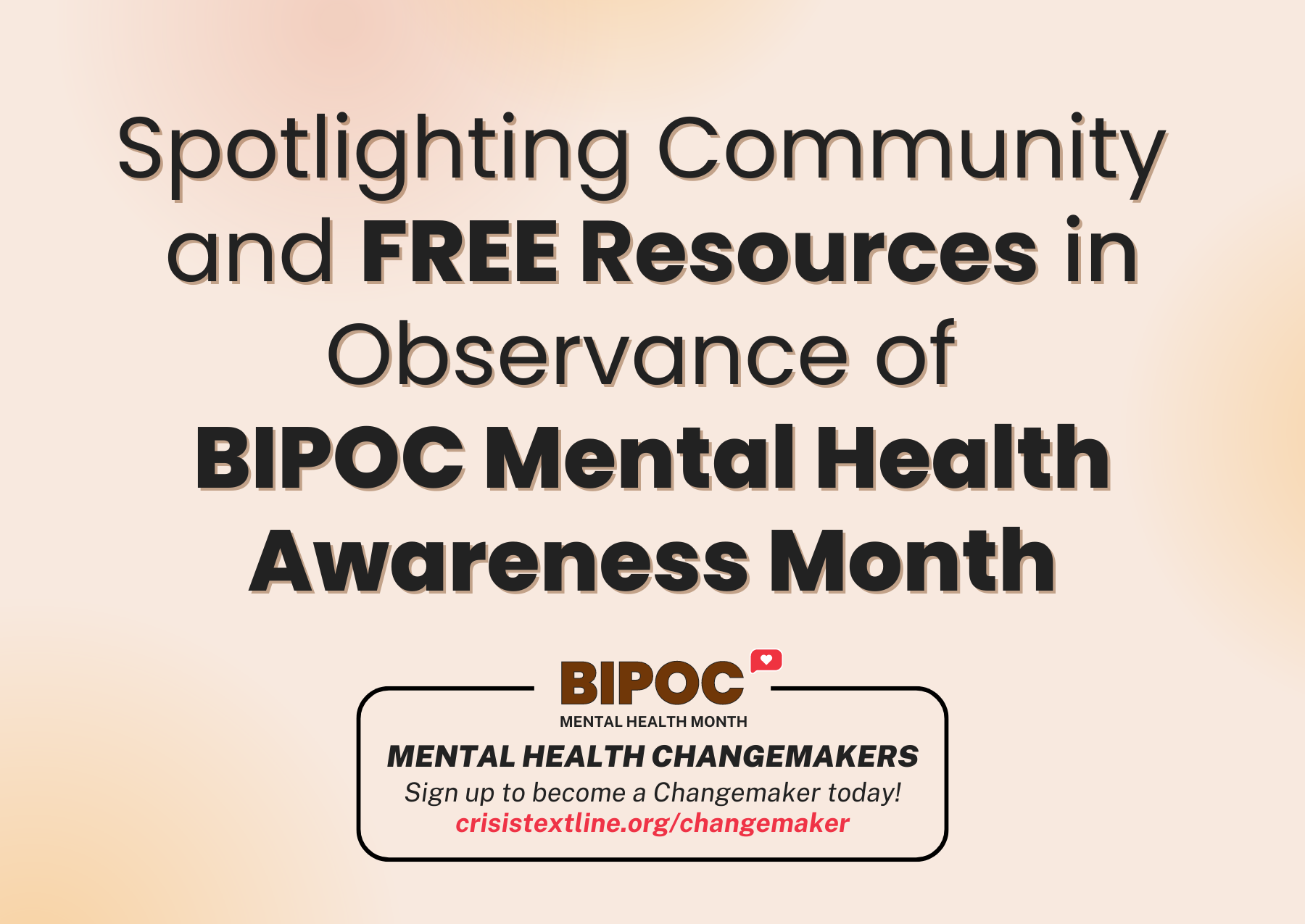Spotlighting community and FREE resources in observance of BIPOC Mental Health Awareness Month

July is BIPOC Mental Health Month! Sometimes called Minority Mental Health Awareness Month or Bebe Moore Campbell National Minority Mental Health Awareness Month, this annual recognition gives us an opportunity to acknowledge the unique mental health struggles that underrepresented groups, like Black, Indigenous, and People of Color (BIPOC) face. The month was advocated for by author Bebe Moore Campbell – who was active in raising awareness about mental health issues, particularly within Black communities. BIPOC Mental Health Month seeks to raise awareness, promote culturally tailored services, and advocate for equitable mental health care and resources for these historically excluded communities.
In our commitment to centering equity and getting it done together, we celebrate and honor BIPOC mental health advocates who inspire us through their positive impact and support. These changemakers are active Crisis Text Line volunteers who take initiative in their communities and consistently support our texters and passionately advocate for mental health, striving to make the world a better place each day. This July, we honor Kanna Stephenson, an advocate for change who raises awareness within the BIPOC community and supports individuals in crisis and anyone else in need of someone to talk to.
What inspired you to volunteer for Crisis Text Line?
A crisis counselor named Bex. They helped me when I was texting in. It was like I had someone when I was all alone. They gave me hope that kindness is in the world and with that I signed up and now 4 years later here I am, a crisis counselor and now a changemaker.
What does being a Changemaker mean to you?
Bringing and spreading kindness into the communities you live in, socialize in, etc. Mental health impacts everyone. It doesn’t matter your social status, financials, nothing. As a changemaker, I believe you go above and beyond and you impact your communities, an individual person you know and you do everything in your power to show them kindness. The world needs more kindness and the only way for that to happen, well it starts with us.
What does BIPOC Mental Health Month (Black, Indigenous, and People of Color (BIPOC) mean to you?
This is an impactful month. I’m of mixed descent and when I would talk to counselors about my problems of being mixed, I was treated like the problems of being mixed didn’t exist. This month is to spread awareness to communities and individuals that no matter your race you can have these feelings and it’s okay because they are real and valid and there are people like me who care and want to help.
How did you first hear about Crisis Text Line?
I heard about the Crisis Text Line on Facebook back in 2018. It took me 2 years to get the courage to sign up for the volunteer program because I spent that time making sure of the legitimacy of them.
What would you say to someone who’s interested in being a Changemaker?
Jump on in. Do it. It can seem scary at first, but after that person, that first moment, it’s worth it and you just keep doing it.
Join a community of empathy and support, and help those around you by becoming a volunteer Crisis Counselor today. Prefer to support in other ways? Consider donating to Crisis Text Line instead – donate here.
July is BIPOC Mental Health Month
What is BIPOC?
BIPOC stands for Black, Indigenous, and People of Color. It is a term that has gained popularity in recent years, particularly in discussions around race, social justice, and equity. The term BIPOC emphasizes the unique experiences and struggles of Black and Indigenous people, who often face different and more severe forms of systemic racism, racialization and marginalization. By specifically highlighting Black and Indigenous people, the term aims to acknowledge and address the historical and ongoing impacts of racism on these communities within the United States.
We understand that choosing a single term to represent all communities of color is challenging, and not all terms are interchangeable. There is no “one size fits all” language when it comes to talking about race and ethnicity, and we do acknowledge the limitations of the term BIPOC.
How does the BIPOC community overcome the unique struggles that they face?
The BIPOC community employs a variety of strategies to overcome struggles related to mental health, often drawing on resilience, cultural strength, and community support. The community, like others, uses a variety of coping tools that offer relief and support primarily by talking to loved ones, family, friends, and therapists, but also by listening to music and playing video games. Community-based organizations and support groups provide safe spaces for sharing experiences and accessing resources, fostering a sense of belonging and understanding. Advocacy and activism are also crucial, as individuals work to dismantle systemic barriers and stigmas associated with mental health care within their community, pushing for equitable access to services.
BIPOC mental health resources available
Access to mental health care and resources is crucial for the well-being of the BIPOC community, which often faces unique challenges. Mental health services focused on these individuals can provide culturally tailored care, recognizing the specific stressors and traumas experienced by these communities. Resources such as therapy with culturally aware practitioners, support groups that focus on shared experiences, and community-based programs can help bridge the gap in mental health care. Additionally, Crisis Text Line and our partners are committed to providing help to all individuals. We’re a free, anonymous, 24/7 platform providing support to anyone in need of it. Reach out anytime by texting CONNECT to 741471.
Expanding mental health education and advocacy within BIPOC communities is essential for promoting understanding, reducing stigma, and ensuring equitable access to the necessary support and care. Find more resources for BIPOC mental health from our partners at The Defensive Line. The Defensive Line aims to end the epidemic of youth suicide, especially for young people of color, by transforming the way we communicate and connect about mental health.
Support the BIPOC Community Today
There are a variety of ways you can support the BIPOC community this month and every month. First, it’s important that we are actively listening, educating ourselves, and advocating for systemic change. It’s helpful to share resources, like access to Crisis Text Line’s services. Educating oneself about the cultural contexts and specific mental health needs of BIPOC communities is crucial, as is promoting and supporting culturally tailored mental health services. Advocating for policy changes that address disparities in mental health care access and funding is another critical step. Additionally, allies can support BIPOC-led mental health organizations and initiatives, amplifying their work, embracing cultural differences and supporting their businesses.
If you ever need support, we are here for you. Text CONNECT to 741741 to reach a live volunteer counselor. Or if you are interested in making a difference and changing or saving someone’s life, join our volunteer community today.

